#judicial bias
Text
And then— there’s the concept of “a free, fair, and unbiased” judiciary.
That’s what they toss around like solid gold confetti all the time
as if it just rains down upon us all in a celebratory fashion.
There are some actual attorneys out there who do bravely confront the “elephant in the room” out loud;
about how increasing masses of us have our lives wrecked by judges who nowhere near live up to this hypnotizing ideal.
It’s actually all arbitrary too.
People get all excited about certain actual “legal principles” when they learn that they exist.
“Judicial bias” is one of those.
It’s also one of the biggest mindf**ks there is in the American legal system.
Of course, judges are biased.
Every single human being alive is biased.
We’d like to say that they don’t know what they’re saying or doing sometimes.
But, they do.
#EndJudicialDictatorship.
_____
#BeClearAboutThat.
Music credits:
Kevin Luce / kevp888 - VOC_230610-2267_FR_MarchingBand.wav by kevp888 -- https://freesound.org/s/690695/ -- License: Attribution 4.0
Video credits:
Anna Nekrashevich from: https://www.pexels.com/@anna-nekrashevich/
https://www.annpoan.com/ - @ ann.poan - https://www.instagram.com/ann.poan/
#free#fair#unbiased#american#judges#legalsystem#judicial bias#bias#gold#confetti#weneedeachother#america#legaltiktok#beclearonthat#bridge#collapse
0 notes
Text
really funny rewatching criminal minds (and/or other cop shows) and seeing how much of the 'deductions' or 'evidence' are just kind of bull
#txt#i love criminal minds we're on season 5 but like. you have to laugh#also sometimes just the judicial system in general ♡♡♡♡♡♡#<- those hearts are in a sarcastic tone#eg fingerprinting. handwriting analysis. general bias#etc#man i wish i had my uni notes from that one class i took about the (england?) police 1850-1900 or whatever the time period was. AGHH
10 notes
·
View notes
Text
Bridgetown, Barbados. Justice Shonda Griffith (apparent bias) was fired (recused herself) by the Mottleys who just want to get that insurance money for the death of Warren Mottley.
https://youtu.be/8IzRJ0YBHMk
youtube
Did Sahie Griffith, in his demeaning description of Warren, think the Mottley’s would allow him to slide? Slide where!? The Mottleys will get exactly what they want! Have your say. Naked!!
Like. Share. Subscribe. Comment on YouTube.
#Warren mottley#shonda Griffith#sahie griffith#Mia mottley#Elliot mottley#naked departure#barbados#judicial review#apparent bias#recuse#Youtube
0 notes
Text
Daily update post:
The biggest news in my country today, is that Israel has agreed to appear before the International Court of Justice, despite not recognizing the ICJ or its authority.
Why would Israel not recognize it?
The ICJ is the judicial arm of the United Nations. This international body has a KNOWN (and even academically researched) bias against Israel. Which in a sense, is almost unavoidable. The UN as an idea has international representation, with equality for all. No sanctions or a lesser status for non-democratic countries, no sanctions or a lesser status for abusers of human rights, and no sanctions or a lesser status for countries biased against Israel or against Jews (and therefore against Israel, as a Jewish state). Generally speaking, the ADL estimates that about 26% of the global adult population holds antisemitic views. That means that if the UN correctly represents the global population, about 1 in every 4 of its members, is antisemitic. That's before we talk about blocks coming into play (think of the anti-Israel Arab block alone, with its oil and influence. An Israeli diplomat once said, that if Algeria introduced a resolution that the world was flat, and Israel had flattened it, this resolution would pass automatically), or about countries or heads of state, that hold institutional antisemitic positions, such as Iran (where the Islamist regime denies the Holocaust, and has openly been threatening Israel with destruction for years, meaning they are explicitly stating they are looking to kill the biggest Jewish community in the world. Oh, and Iran is currently chairing the UN human rights council).
To appear before the court, is to legitimize it. But there's a catch 22 here. If Israel is being accused at the ICJ of committing war crimes, or even a genocide (which should be harder to prove, because it involves proving intent), and Israel knows it isn't, but it won't appear before the court (to not legitimize it), yet other countries do recognize the ICJ, and no one will defend Israel there if it doesn't appear before the court itself, then how can its innocence of the charges be proven? By not appearing, Israel's conviction is almost a given, regardless of what it actually does.
Yet appearing before the court, and being innocent of the charges, doesn't guarantee an acquittal, when the ICJ is biased. What is worse, a conviction when Israel is absent, where it's clear the trial wasn't fair (since the accused didn't get to defend themselves before the court), or a conviction despite Israel's appearance and innocence, where the trial still isn't fair, but it might not be as immediately evident, since Israel did participate in the trial?
For now, it seems Israel chose to hope the ICJ is not so biased, and decided to appear before it. Let us hope that's not a mistake.
But I can testify from my own experience as a soldier, that we were very much taught to pursue minimal harm to the enemy as an ideal, as a part of the IDF's code of ethics, one of the first things you learn as an Israeli soldier. We were taught that if an order we were given strikes us as immoral (because it carries harm to someone), it is our moral duty to refuse to follow it. I've also heard an interview, with an Israeli fighter pilot, who said he feels calm, knowing every target that he's sent to strike, has been checked by a legal team, that a strike against it does not constitute a war crime. I've also seen strikes being canceled when an Israeli soldier recognized civilians near the target. I'll also say I have heard foreign military seniors say that the IDF fights with a moral standard that they've never seen from any other army. I don't think that's something that any soldier would easily say, since it indirectly criticizes their own army.
So I am as confident as I can be, without serving myself during this war, that if Israel got a fair trial, no court would convict it. Now the only question is whether we would get one. I guess time will tell.
(for all of my updates and ask replies regarding Israel, click here)
#israel#antisemitism#israeli#israel news#israel under attack#israel under fire#israelunderattack#terrorism#anti terrorism#hamas#antisemitic#antisemites#jews#jew#judaism#jumblr#frumblr#jewish#resources#un
293 notes
·
View notes
Text

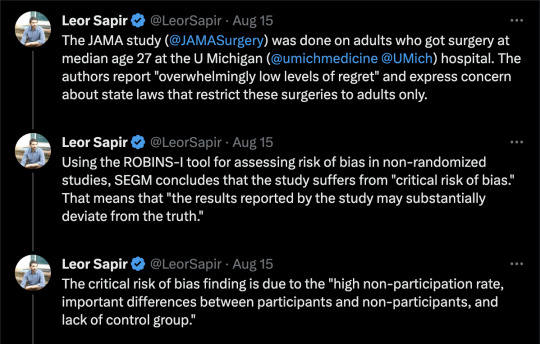
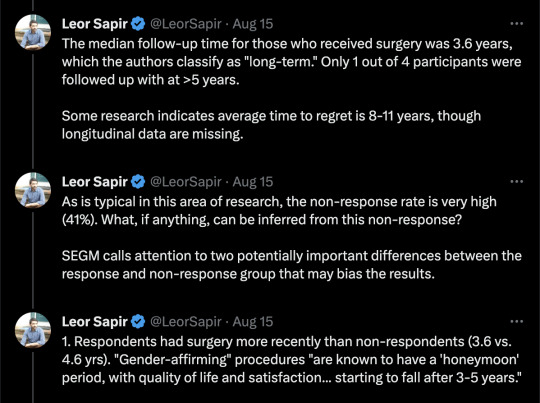


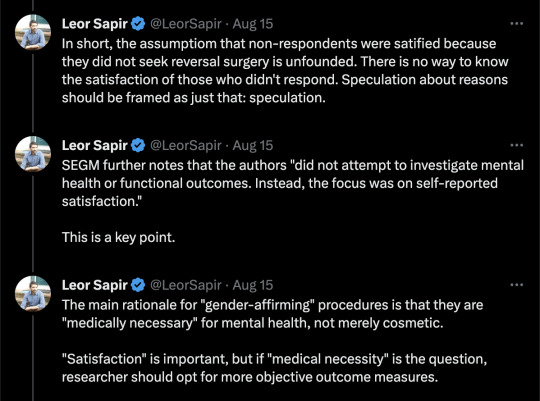


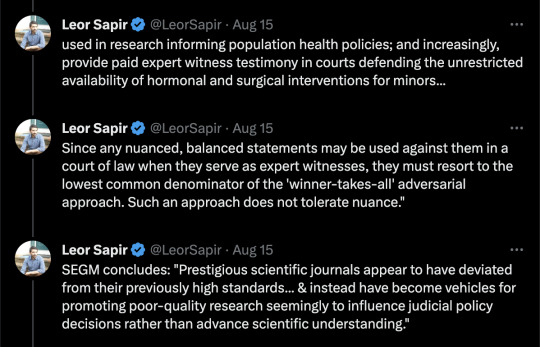


By: SEGM
Published: Aug 13, 2023
Near-zero regret” findings among adults suffer from a critical risk of bias and have low applicability to youth
Recent research published in JAMA Surgery evaluated satisfaction and regret among individuals who had undergone chest masculinizing mastectomy at the University of Michigan hospital. The average patient age at the time of mastectomy was 27 years; no patients who were under age 18 were allowed to participate in the study.
The participants reported high levels of satisfaction and low levels of regret at an average of 3.6 years following mastectomy. The study authors lauded the “overwhelmingly low levels of regret following gender-affirming surgery,” and framed their findings as in conflict with the “increasing legislative interest in regulating gender-affirming surgery,” referring to current legislative attempts to restrict or ban “gender-affirming” procedures for minors. Another group of authors provided an invited commentary on the paper, reinforcing the view held by the study authors, and asserting the presence of a “double standard:” “gender-affirming” mastectomies have come under undue scrutiny by states’ legislators, while other surgical procedures with higher regret rates do not appear to concern legislative bodies.
The study suffers from serious methodological limitations, which render the findings of high levels of long-term satisfaction with mastectomy among adults at a "critical risk of bias"—the lowest rating according to the Risk of Bias (ROBINS-I) analysis. ROBINS-I is used to assess non-randomized studies for methodological bias. The "critical risk of bias" rating signals that the results reported by the study may substantially deviate from the truth. The results also suffer from low applicability to the central issue the study and the invited commentary sought to address, which was whether legislative attempts to regulate “gender-affirming” surgeries are warranted in minors. Unfortunately, these highly questionable findings are misrepresented as certain and highly positive by both the study authors and the invited commentators, several of whom have significant conflicts of interest.
Below, we provide a detailed explanation of the key methodological issues in the study which render its claims untrustworthy and not applicable to the patient population at the center of the debate: youth undergoing gender reassignment. We also comment on the alarming trend: several prestigious scientific journals appear to have deviated from their previously high standards for scholarly work and instead have become vehicles for promoting poor-quality research, seemingly to influence judicial policy decisions rather than advance scientific understanding. We conclude with recommendations about how journal editors can restore the integrity of scientific debate and raise the bar on the quality of published studies in the field of gender medicine.
[ For in-depth analysis, see: https://segm.org/long-term-regret-satisfaction-mastectomy-critical-appraisal ]
SEGM Take-Aways
Although this study reports extremely high rates of satisfaction and low regret, the timeframe in which these outcomes were assessed is insufficient—just 3.6 years post-mastectomy on average. The sample is also highly skewed: 50% of the participants had mastectomies in the last 3.6 of the 30 years. This skewing of the length of time since surgery is expected, given the sharp rise in the number of people (especially adolescents and young adults) identifying as transgender and undergoing chest masculinization mastectomy. It is also a short time in which to assess regret, particularly since one quarter of study participants were younger than age 23 at time of surgery and the median age of first birth in the US is 30 years.
The conclusion of high satisfaction/low regret suffers from a critical risk of bias due to the high non-participation rate, important differences between participants and non-participants, and lack of control group. Problematically, the authors misuse the (critically-biased) results from adults to argue against regulations for irreversible body alternations for minors and do so with a decidedly politicized spin.
The only intellectually honest commentary is that we do not have good knowledge of the likely rates of detransition and regret following chest masculinization mastectomy, nor do we know how many people experience regret but remain transitioned. There is an urgent need for quality research in this area. Previously, detransition and regret rates were considered to be low: they may have indeed been low due to the much more rigorous screenings, or the results may have been biased by the notoriously high dropout rates that plague “regret” research. Regardless, there is now growing evidence of much higher rates of medical detransition.
A recent study from a comprehensive U.S. dataset with no loss to follow-up revealed a 36% medical detransition rate among females within just 4 years of starting hormonal transition. At least two recent studies suggest that average time to regret among recently-transitioned females is about 3-5 years, but there is a wide range. Much less is known about detransition among those who undergo surgery. A growing number of detransitioners now express regret associated with the loss of breastfeeding ability, with one case study detailing breastfeeding grief experienced some 15 years post-mastectomy.
The study and invited commentary exemplify three problematic trends that plague studies emerging from the gender clinics: problematic conflicts of interest of the authors; leveraging scientific journals to disguise politically-motivated pieces as quality research; and a conflicted stance by the gender medicine establishment on surgery for minors. We expand on each briefly below.
Conflicts of interest of study authors and commentators
The significant conflicts of interest of the gender clinicians who study and report on the outcomes of “gender-affirming” interventions cannot be overlooked. These clinicians are conflicted financially, since their practices specialize in “gender-affirming” interventions, as well as intellectually. While conflicts of interest among experts are common, such experts should still attempt to be balanced in their discussions and should acknowledge and reflect on their conflicts of interest.
The interpretations of the data in the study is neither rigorous nor balanced, and both the study and the invited commentary have a decidedly political spin. Further, the invited politicized commentary does not disclose that at least one of the authors is a key expert witness opposing states’ efforts to regulate “gender-affirming” surgeries for minors. This role alone precludes the ability to provide a balanced commentary.
There is a fundamental problem with research emerging from gender clinic settings. The same clinicians provide gender-transitioning treatments to individual patients in their practice; serve as primary investigators and custodians of data used in research informing population health policies; and increasingly, provide paid expert witness testimony in courts defending the unrestricted availability of hormonal and surgical interventions for minors.
As a result, such clinicians cannot express nuanced perspectives. Since any balanced statements may be used against them in a court of law when they serve as expert witnesses, they must resort to the lowest common denominator of the "winner-takes-all" adversarial approach. Such an approach does not tolerate nuance. Unfortunately, this approach contributes to the erosion of the quality of the published work in the arena of gender medicine and accelerates loss of trust about the integrity of the scientific process.
Misuse of scientific publications to promote politically-motivated articles disguised as scientific research
That prestigious medical journals now serve as platforms for promoting misleading, politically motivated research that aims to apply a veneer of misplaced confidence in highly invasive, irreversible treatment should worry everyone committed to evidence-based medicine and the integrity of science. Moreover, it impairs our ability to accurately assess and improve the long-term health outcomes of the rapidly growing numbers of gender-diverse and gender-distressed youths.
This is not the first time that a JAMA has been used as a platform for positioning advocacy for “gender-affirming” care as scientific research. In 2022, JAMA Pediatrics published a study that assessed bodily happiness in a group of subjects aged 14-24 three months after chest masculinization mastectomy. Despite the very short follow up and dropout rate of 13%, the authors argued that their findings supported the premise that there was no evidence to suggest that young age should delay surgery. They also asserted that their research would help dispel the misconception that such surgeries are experimental. The editorial commissioned to bolster the authors claims was descriptively titled, “Top surgery in adolescents and young adults-effective and medically necessary.”
Another troubling trend is the misuse of statistical tools to reframe research findings that contradict the author's own position. For example, a well-known study that claimed that access to puberty blockers reduce the risk of suicide disregarded the fact that individuals reporting use of puberty blockers use had twice as many recent serious suicide attempts as their peers who did not use puberty blockers. Like the finding cited above, the doubling of suicide attempts was not statistically significant due to a small underpowered sample—but the magnitude of the effect was striking and should have tempered the authors’ enthusiastic conclusion that puberty blockers prevent suicides. Another recent gender clinic study, widely and positively covered by major media outlets, claimed that puberty blockers and cross-sex hormones led to plummeting rate of depression—even though the rate of depression among youth taking those medications remained demonstrably unchanged. More information about problems with research originating from gender clinics is detailed in this recent analysis.
Gender medicine’s stance on pediatric surgery
More generally, the gender medicine establishment is in a curious state of internal conflict about its stance on “gender-affirming” surgeries for minors. On the one hand, it has become common for advocates of “gender-affirmation” of minors to insist that surgeries for minors are not performed and anyone who suggests otherwise is spreading “scientific misinformation” and “science denialism.” On the other hand, gender clinicians publish mastectomy outcomes for minors in major medical journals, and laud surgeries for minors as “effective and medically necessary.” It is not uncommon for these opposing claims to be made by the same group of researchers and clinicians, as they test various arguments, searching for the "angle" that is most likely to convince judges and juries--and public at large--that scrutiny of the practice of pediatric transitions, which is increasingly occurring in European countries, is not warranted in the United States.
Notably, none of the European countries that are enacting severe restrictions on the use of puberty blockers or cross-sex hormones for minors have ever allowed surgeries for youth under 18. That the U.S. gender affirmation professionals continue to fight regulation of these problematic procedures speaks volumes about how far the U.S. healthcare has drifted when it comes to "gender affirmation" of minors.
Final thoughts
While it is challenging to determine how best to reduce the temperature of the highly politicized nature of the debate in gender medicine, the editors of scientific journals can begin to restore balance by recognizing how far the field has drifted from the standards of quality scientific research, and begin to expand their circle of peer-reviewers to those with diverse views. Inviting those concerned with the state of gender medicine (and not just the practices’ advocates) into the peer-review and commentary process is the first essential step to improve the quality of research published in the field of gender medicine.
--


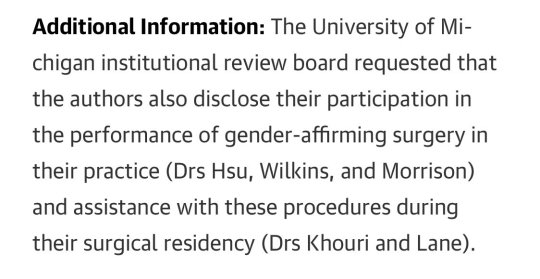
--

==
The activists are predictably - and consistent with the superficiality of their own ideology - upset that anyone should look below the surface. It seems to be more troubling that anyone would notice the shoddiness of the research, than that the research is shoddy.
If this is supposed to be "healthcare," you would think that they would want the best healthcare, and be more alarmed at the misrepresentations of the study, than by people finding those misrepresentations.
Could it be that this is ideological rather than medical? 🤔
The conflicts of interest and funding sources alone are remarkable.
#Leor Sapir#SEGM#Society for Evidence Based Gender Medicine#double mastectomy#top surgery#gender affirming mastectomy#ideological corruption#ideological capture#medical malpractice#conflict of interest#sarcastic font#medical scandal#medical corruption#gender ideology#genderwang#queer theory#gender affirming care#gender affirming surgery#gender affirming healthcare#medical mutilation#sex trait modification#religion is a mental illness
276 notes
·
View notes
Text
Here’s a tournament for characters whose secondary ability seems to be how quickly they adopt children. To qualify for this tournament, a character must have at least two kids who are not blood related. For the purposes of this poll, adoption does not have to be legal, it can be emotional, or even just a headcanon. We are all fans of found family here.
Submissions will stay open until October 23, 12 pm CST, or until I say otherwise!
(UPDATE, 10/9/2023: I have said otherwise: Submissions have now closed on 10/9/2023, 12 pm CST!)
Additional rules:
No Harry Potter, please! I’m not gonna be associated with that franchise
Please, no real people
Propaganda is encouraged! It will be reblogged judiciously, yet often.
For the sake of your mod’s mental health, please keep all propaganda PG-13!
Automatic submissions due to mod bias include Optimus Prime of the Transformers franchise, and Kanan Jarrus/Hera Syndulla of Star Wars: Rebels. However, I will not be writing propaganda for them, so you may submit these characters to include that!
I ask that, if possible, you submit parents individually. However, as one of my own entries is a couple, I’m not gonna hold fast to that rule. Just tell me why you decided to submit them as a pair or group
Be nice! Though I will accept counter propaganda, I do reserve the right to block users who are not being civil, or disqualify a character whose fans are being toxic. (With that being said, I will be turning off anon messages.)
I reserve the right to make additional rules as I see fit.
Have fun!
Tagging for visibility:
@foundfamilyadoptionagency @foundfamilyappreciation @siblingtournament @princessandknightfight @drift-compatible-poll @fuckaroundandfindouttournament @let-them-say-fuck-tournament @big-brother-battle-bracket @youngersiblingstournament @mommy-daddy-issues-poll @friends-to-lovers-tournament
215 notes
·
View notes
Text
Apparently transpeople will also die from the inaccurate recording of Sex within statistics
The collection of data on a person’s sex – that is, whether they are male or female – has become controversial in recent years, and a number of public bodies have moved away from collecting data on sex as a result. For example, Scotland’s chief statistician recently issued guidance stating that data on sex should only be collected in exceptional circumstances. This move has been greeted with alarm by quantitative social scientists who believe that data on sex is vitally important and that data on both gender identity and sex is needed.
The Office for National Statistics (ONS) was also embroiled in controversy when it proposed to guide respondents to the 2021 England and Wales census that they may answer the sex question in terms of their subjective gender identity, rather than their sex. This was despite the fact that the 2021 census also included a new separate question on gender identity. The ONS was forced to change its proposed guidance on the sex question by a judicial review and went on to advise that people should answer the first question to reflect their legal sex. The Scottish census authorities have been criticised for disregarding the implications of that judgment.
Statistics on employment, health, crime and education have all been affected by this trend.
The Government Equalities Office has issued guidance to employers who are legally bound to report on their gender pay gap to provide data on their employees’ gender identity, not their sex, and to exclude employees who “do not identify as ‘men’ or ‘women’” from the data. This makes it impossible to assess whether natal males who identify as trans or non-binary may have different labour-market experiences from natal females who identify as trans or non-binary. Yet non-binary or transgender identification may not protect females from discrimination, for example, on the basis of pregnancy or maternity or the perceived risk of becoming pregnant.
The NHS decides who to call for routine medical screenings based on the gender marker a person has recorded with their GP rather than their sex as recorded as birth. The NHS’s failure to record biological sex on patient records has led to trans patients not being called in for screening for conditions that may affect them due to their sex, such as ovarian cancer or prostate cancer. If trans patients are not screened for such conditions, the consequences are potentially fatal. The use of gender identity rather than sex has also led to confusion for some trans patients attempting to use sexual health services.
Freedom of information requests have revealed that multiple police forces in England now record crimes by male suspects as committed by women if the perpetrator requests to be recorded as such. Even small numbers of cases misclassified in this way can lead to substantial bias in crime statistics.
Differences between the sexes are an important factor for analysis in most, if not all, of the areas that social and health scientists address. Sex, alongside age, is a fundamental demographic variable, vital for projections regarding fertility and life expectancy. Sex has systematic effects on physical health and is also linked to mental health. And the importance of sex extends to all aspects of social life, including employment, education and crime.
We know that many differences between the sexes have changed dramatically over time – education and labour market participation are two examples. Without consistent data on sex, social scientists would not be able to track this change over time or to understand whether efforts to improve the representation of women and girls in domains where they are underrepresented have been effective.
We have been losing data on sex, as public sector bodies have switched to collecting data on gender identity instead. But the tide may have turned. The UK Statistics Authority has recently published guidance that recommends that “sex, age and ethnic group should be routinely collected and reported in all administrative data and in-service process data, including statistics collected within health and care settings and by police, courts and prisons”. It also says data producers should clearly distinguish between concepts such as sex, gender and gender identity.
Both people’s material circumstances and their identities are important to their lives. We know that sex matters, and we have much to learn about the ways in which gender identity matters, too. Rather than removing data on sex, we should collect data on both sex and gender identity, in order to develop a better understanding of the influence of both of these factors and the intersection between them.
Original article in The Conversation
Professor Alice Sullivan’s academic profile
UCL Social Research Institute
137 notes
·
View notes
Text
29 notes
·
View notes
Text
@LivePDDave1
President Trump isn't allowed to speak about crooked Judge Juan Merchan's daughter due to the unconstitutional GAG ORDER he slapped him with. What is Judge Merchan so afraid of? While Trump isn't allowed to say anything about Judge Merchan's radical leftist daughter, we are. In case you missed it, here's the skinny... As news started to leak about Judge Merchan's dirty family dealings just before the trial started, this heavily conflicted judge hit Trump with an even broader gag order to protect his deranged TDS activist daughter, Loren Merchan. According to legal analyst Mike Davis (
@mrddmia
), "Gag orders generally protect the Sixth Amendment right of DEFENDANTS to fair trials. Defendants still have First Amendment rights. Ordering any defendant not to speak about his charges would almost certainly violate the First Amendment." Merchan overseeing Trump's case to begin with is a grotesque mockery of the scales of justice when you factor in his putrid cocktail of blatantly partisan ties. Federal Election Commission (FEC) filings reveal a troubling financial allegiance—a slew of donations to ActBlue, specifically earmarked for Biden's campaign, and substantial funding for the vehement anti-Trump group "Stop Republicans." The rot runs deeper with his daughter Loren's consulting firm funneling a staggering $250 million to progressive causes, indelibly intertwining the family's fortunes with those who seek to fervently oppose Trump. After Trump raised this concern on Truth Social, triggered Judge Merchan hit Trump with a more sweeping gag order to shield his radical liberal daughter. It's more than questionable or suspicious—it's an outrageous distortion of judicial neutrality that has no place in our system. This disgusting panorama of the Merchan family’s financial and political entanglements paints a damning portrait of judicial bias, one that loudly called for his immediate recusal from the case before it even started. Judge Merchan not only tarnishes the bench but shits all over the very concept of impartiality and the cherished, long-standing principle that justice should be blind.

17 notes
·
View notes
Text
Many major Western newspapers, magazines and broadcast media never hesitate to malign Israel on big issues—like how Israel is “mishandling” a war against terrorists in Gaza, how it is “illegally” building communities in Judea and Samaria, or how it is “threatening democracy” by reforming its broken judicial system. But equally harmful is the daily drumbeat of less obvious lies and innuendo embedded in the majority of reporting on Israel in such media as the New York Times, CNN, MSNBC, NPR and the Associated Press (AP).
The biggest reason for falsehoods is “anti-Israel newsroom culture.” Some media, like the Times and AP are serial offenders. They publish falsehoods and biased analysis reflexively, while their management does nothing to stop it. Other media are guilty of errors through ignorance: Reporters offer “facts” they believe are true without checking them, and fact-checkers in busy, under-funded newsrooms are often non-existent.
In either case—politicized bias or outright ignorance—such a steady flood of anti-Israel reporting and analysis at major media amounts, at best, to journalistic malfeasance and at worst, to antisemitic hate speech.
Certain media outlets are just blatantly biased against Israel, period. A study conducted by noted Israeli journalist Lilac Sigan, for example, revealed that over the course of the last year and a half, the Times’ coverage of Israel was largely negative. For instance, out of the 148 articles the Times published about Israel in the first quarter of 2023, 67% were negative, while only 4.7% were positive. The remaining 28.3% were neutral.
Matti Friedman, a former AP writer, outlined his former employer’s anti-Israel culture in a 2014 essay. He wrote that when he and another reporter proposed to do a story on Palestinian corruption, his bureau chief told him this was “not the story,” even though AP covered Israeli corruption at length. Friedman also compiled 27 articles on the “moral failings of Israeli society” between Nov. 8 and Dec. 16, 2011, and noted that this seven-week tally of articles was higher than all stories significantly critical of Palestinian government and society published by his bureau in the preceding three years.
During the fighting in Gaza in 2008 and 2009, Friedman was forced to erase a significant detail from AP’s coverage—the fact Hamas fighters dressed as civilians were counted as part of the civilian death toll. He did this because of a threat to AP’s reporter in Gaza. He also noted that it was AP’s policy “ not to inform readers that the story is censored unless the censorship is Israeli.”
59 notes
·
View notes
Text
"AB3070, as a well-intentioned law, it was aimed at trying to eliminate implicit bias in jury selection. But I think that this law has gone too far by ... making it so hard to remove jurors," says Nicole Castronovo, a trial attorney.
"It really endangers the justice system." 🤔
Source: 👇
#pay attention#educate yourselves#educate yourself#knowledge is power#reeducate yourself#reeducate yourselves#think about it#think for yourselves#think for yourself#do your homework#do some research#do your own research#ask yourself questions#question everything#rule of law#law#law and order#government corruption
36 notes
·
View notes
Note
anti-trans laws have nothing to do with blacks though, US laws apply to everyone you sound conceited.
i dont really care to argue with you because you are clearly uneducated on this topic and im not debating anything with people that refuse to look at reality, below are some documentaries, books, articles, series, and in depth studies on what i mean when i say virtually every law in america has been shaped by black people and our fight for equity and true liberation, it’s all connected and to think otherwise is just anti intellectual
• black americans and shaping the law : a full time line of all instances of african americans impacting our law ( videos, articles, links to documentaries and studies )
• the black codes, public facilities, jobs, purchases, and social outings impacted by racism ( article )
video on laws as a result of the black codes
• founding of democracy through black liberation ( article and free books, please use your phone reader or ad blocker to avoid paywall )
• connections of transphobia and antiblack racism in relation to white supremacy ( article and studies )
• medical history in america and racism ( article and studies )
another on the origin of medical eugenics
• african sexuality and gender before and after colonialism ( articles and free books )
• black people and the disproportionate rate of human trafficking, history of laws in the sex trade ( article )
another on the socioeconomic implications of human trafficking statistics
• testing dummies in the medical world, how black americans have been used as living subjects without consent and how this reflects in modern medicine ( article )
another on black experimentation
• impact of antiblack racism on american society ( articles, studies, videos and documentaries, all free )
• lawyers did not have to pass “the bar” until black people began studying the law, a history of how hurdles were created to prevent black people from being in our judicial system ( article )
a document detailing “the bars” racist origin
• bias in the judicial system as a result of chattel slavery ( synopsis with link to free book )
• gynecological roots in slavery, how birth control contraceptives and abortion were tested and studied on enslaved black woman ( article )
another historical study, another on abortion
• race and education, the creation of tuition and lottery’s for schools in effort to keep people of color out ( article )
another on stats of segregation in schools, and another directly about tuition practices ( please use your phone reader or phone reader to avoid paywall )
• antiblackness fueling gun violence and mass shootings across the country ( video )
• sexual violence, sexually transmitted disease and misogynoir : an extensive history and study of reproductive health regarding black women ( article and studies )
• the loop hole of the 13th amendment, legal torture, slavery, and abuse all because of race ( documentary )
i hope you change as a person one day and realize we aren’t enemies and you’ve been taught to hate and discredit us by people who would gladly do the same harm onto you ( that they are starting to do now ) that they’ve done to us for the entirety of our existence in america, im not being conceited, im trying to make you understand we are on the same team
73 notes
·
View notes
Photo
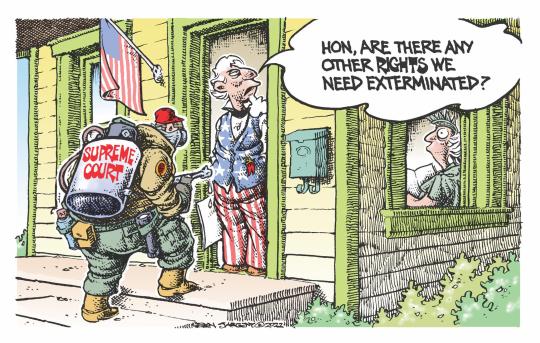
[From Robert B. Hubbell’s Newsletter]
Fifth Circuit holds a biased and embarrassing hearing on the mifepristone ruling of Judge Kacsmaryk
Federal district Judge Matthew Kacsmaryk issued an order withdrawing the FDA’s approval of mifepristone. A panel of the 5th Circuit Court of Appeals upheld Judge Kacsmaryk’s ruling and ordered that the ruling go into effect immediately. The US Supreme Court reversed the 5th Circuit and issued an unusual order that effectively told the 5th Circuit it could not ban the distribution of mifepristone until the Supreme Court ruled on the matter. In other words, the Supreme Court put the 5th Circuit on a “time out” for bad behavior.
A panel of the 5th Circuit Court of Appeals held oral arguments on the merits of the appeal today. The hearing was an embarrassment. The judges acted like petulant children who were upset that they had been reprimanded. Worse, they made no pretense of maintaining impartiality or objectivity—or adherence to the rule of law. The obscene display of judges following personal religious convictions rather than the Constitution is explained by Mark Joseph Stern in Slate, The 5th Circuit is furious that the Supreme Court put it in mifepristone timeout.
I highly recommend reading Stern’s article in full to get the full flavor of the hearing. Stern is at his best in this article. He writes, in part:
And here’s the punchline: Nothing these intellectual Lilliputians do will even matter. The Supreme Court has already decided that the 5th Circuit cannot be trusted with this case: In April, it froze the court’s previous decision stringently limiting access to mifepristone, expressly maintaining the freeze until the justices themselves take further action. Elrod, Ho, and Wilson are howling into the wind; they have no power to change a thing about federal regulation of medication abortion. The adults in the room have already put them in time-out. And rather than demonstrate that they can judge responsibly, they seized on Wednesday’s hearing to throw a combination temper tantrum/gaslight party. No lessons have been learned, no maturity acquired. This time-out probably isn’t ending anytime soon.
Ho read aloud random people’s criticisms of the FDA and made Ellsworth respond to them, then declared that federal courts should override the FDA’s scientific determinations because the agency isn’t trustworthy.
These are not serious people. This is not how real judges conduct themselves. This was barely a judicial proceeding. It was a struggle session in which three anti-abortion zealots yelled at attorneys who have already prevailed in this case once at the Supreme Court. Their rage should have been aimed at SCOTUS, but it’s not a good look for lower courts to trash-talk their superiors, so they redirected it to Harrington and Ellsworth instead. (Erin Hawley, wife of Sen. Josh Hawley, argued against mifepristone; the less said about her unceasing stream of shameless falsehoods, the better.)
I also recommend Talking Points Memo, Right-Wing Judges Mulling Restricting Abortion Drug: Isn’t The Real Problem Here How Mean You All Were To Kacsmaryk?
If we had a functioning Supreme Court that cared about the rule of law, it would castigate the 5th Circuit panel for its shameful display of bias, animus, and religious zeal.
But, as Stern notes, the 5th Circuit cannot restrict the distribution of mifepristone. And the failure of the 5th Circuit to address serious legal questions—like the absence of standing by the plaintiff doctors—may doom the 5th Circuit’s opinion to a chilly reception in the Supreme Court. We can only hope.
[Robert B. Hubbell Newsletter]
#corrupt right wing courts#Rule of Law#women's rights#human rights#Kacsmaryk#Corrupt SCOTUS#Radical Right Wing Judges#reproductive Rights#FDA#Robert B. Hubbell#Robert B. Hubbell Newsletter
105 notes
·
View notes
Text
Cognitive Biases
Fundamental attribution error
(FAE, aka correspondence bias)
Tendency to overemphasize personality-based explanations for behaviors observed in others. At the same time, individuals under-emphasize the role and power of situational influences on the same behavior. Edward E. Jones and Victor A. Harris' (1967) classic study illustrates the FAE. Despite being made aware that the target's speech direction (pro-Castro/anti-Castro) was assigned to the writer, participants ignored the situational pressures and attributed pro-Castro attitudes to the writer when the speech represented such attitudes.
Implicit bias
(aka implicit stereotype, unconscious bias)
Tendency to attribute positive or negative qualities to a group of individuals. It can be fully non-factual or be an abusive generalization of a frequent trait in a group to all individuals of that group.
Priming bias
Tendency to be influenced by the first presentation of an issue to create our preconceived idea of it, which we then can adjust with later information.
Confirmation bias
Tendency to search for or interpret information in a way that confirms one's preconceptions, and discredit information that does not support the initial opinion. Related to the concept of cognitive dissonance, in that individuals may reduce inconsistency by searching for information which reconfirms their views (Jermias, 2001, p. 146).
Affinity bias
Tendency to be favorably biased toward people most like ourselves.
Self-serving bias
Tendency to claim more responsibility for successes than for failures. It may also manifest itself as a tendency for people to evaluate ambiguous information in a way beneficial to their interests.
Belief bias
Tendency to evaluate the logical strength of an argument based on current belief and perceived plausibility of the statement's conclusion.
Framing
Tendency to narrow the description of a situation in order to guide to a selected conclusion. The same primer can be framed differently and therefore lead to different conclusions.
Hindsight bias
Tendency to view past events as being predictable. Also called the "I-knew-it-all-along" effect.
Embodied cognition
Tendency to have selectivity in perception, attention, decision making, and motivation based on the biological state of the body.
Anchoring bias
The inability of people to make appropriate adjustments from a starting point in response to a final answer. It can lead people to make sub-optimal decisions. Anchoring affects decision making in negotiations, medical diagnoses, and judicial sentencing.
Status quo bias
Tendency to hold to the current situation rather than an alternative situation, to avoid risk and loss (loss aversion). In status quo bias, a decision-maker has the increased propensity to choose an option because it is the default option or status quo. Has been shown to affect various important economic decisions, for example, a choice of car insurance or electrical service.
Overconfidence effect
Tendency to overly trust one's own capability to make correct decisions. People tended to overrate their abilities and skills as decision makers.See also the Dunning–Kruger effect.
Physical attractiveness stereotype
The tendency to assume people who are physically attractive also possess other desirable personality traits.
(via: Cognitive bias - Wikipedia)
14 notes
·
View notes
Text
The legal briefs are piling up in Florida.
In the coming weeks, prosecutors in the Mar-a-Lago classified documents case against former President Donald Trump must provide more information to Judge Aileen Cannon in compliance with her latest orders. The judge has questioned the “legal propriety” of bringing charges into her courtroom using an out-of-state grand jury.
In a separate setback for special counsel Jack Smith, Cannon struck two filings by prosecutors from the record. These unusual moves generated a torrent of criticism from legal scholars.
Aside from Supreme Court Justice Sonia Sotomayor, Judge Cannon — who of Cuban American descent — is the most prominent Latina judge in the country. She is overseeing a historic case yet is on track to harm the judiciary system, democracy and her own reputation. Her partisan conduct is an embarrassment.
To understand why Cannon is unfit to hear Trump’s case, start with her ruling last week. In it, Cannon asked about the legality of using a Washington, D.C., grand jury in a Florida-based case. But this is normal procedure, as grand juries can be convened anywhere crimes may have occurred. As a federal judge, Cannon should know this.
It’s no wonder that her orders have earned widespread scorn from legal experts. Former Harvard Law professor Laurence Tribe called her approach “dopey and constitutionally dubious.” On X, the platform formerly known as Twitter, a former assistant U.S. Attorney wrote that Cannon “clearly shows her ignorance (bias? both?).” And these were some of the kinder reactions.
This is not the first time Cannon has appeared to favor Trump. After the FBI searched Mar-a-Lago last year, the former president filed a civil lawsuit to stop the Department of Justice investigation. Cannon sided with him, in a decision that was overturned by the 11th Circuit Court of Appeals. In a scathing rebuke, the appellate court found multiple serious errors in Cannon’s initial ruling and decided that she didn’t even have jurisdiction in the first place.
These controversies matter to the Latino legal community because it is rare for a Latino judge to be in the national spotlight. In fact, Latino judges are rare. Though Latinos account for about 19 percent of the U.S. population, only 8 percent of federal judges are Latino. Of these, roughly one third are Latinas.
Cannon is part of a long tradition of Latino jurists, from Alonso Perales, who founded the League of United Latin American Citizens (LULAC) in 1929, to civil rights pioneer Gus Garcia, who argued before the Supreme Court in 1954 to Justice Sotomayor. Cannon’s role in a hugely consequential legal matter could have been a source of pride for Latinos. Instead, calls are mounting for her recusal.
As she tanks her own credibility, Cannon is likewise letting the Latino community down. According to a June Quinnipiac poll, 60 percent of Latinos are following the documents case closely, and 66 percent believe that Trump handled the classified papers in an inappropriate manner. Like other Americans, Latinos want to see the rule of law applied with impartiality. That hasn’t been the case so far, due to Cannon’s emerging pattern of bias.
Cannon’s apparent fealty to the former president is as troubling as it is unfortunate. Look how that worked out for Alberto Gonzales, whose misplaced loyalty to George W. Bush led the nation's first Latino attorney general to resign.
Yes, Cannon is a graduate of the University of Michigan Law School who previously worked in a D.C. law firm and as a federal prosecutor in Florida. But in her current role, she is a legal time bomb who could blow up a case with immense implications for national security and democracy.
Consider that she had no judicial experience before her lifetime appointment to the federal bench by Trump in 2020. Or that as a prosecutor, she worked on only four criminal cases that resulted in trials, for a total of 14 trial days.
Reuters reports that Cannon made rookie mistakes in a trial in June, such as forgetting to swear in the jury, while the New York Times describes her as a judge “who will be essentially learning on the job.”
To borrow a catchphrase associated with Justice Sotomayor, Judge Cannon is no “Wise Latina.” She must recuse herself from the documents case, or prosecutors should seek to have her replaced. She is too problematic and inexperienced to preside over a criminal trial of Donald Trump.
Raul A. Reyes is an attorney and contributor to NBC Latino and CNN Opinion. Follow him on Twitter @RaulAReyes, Instagram @raulareyes1.
48 notes
·
View notes